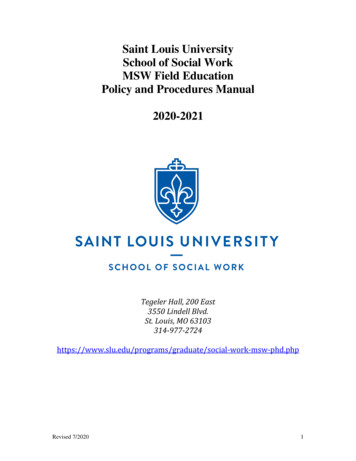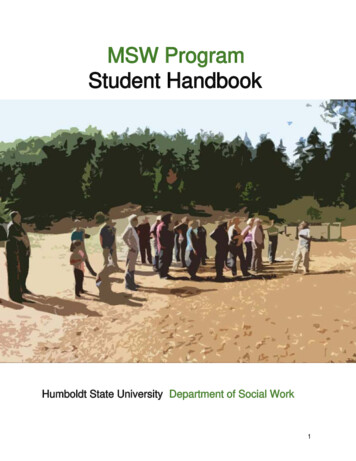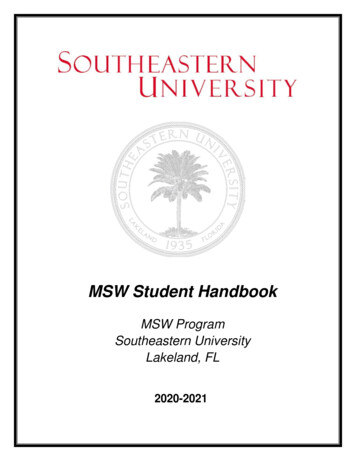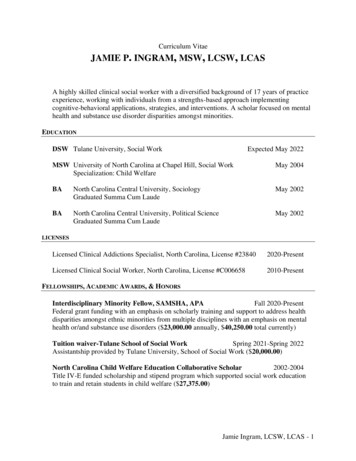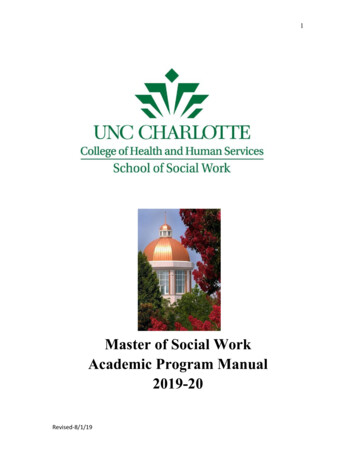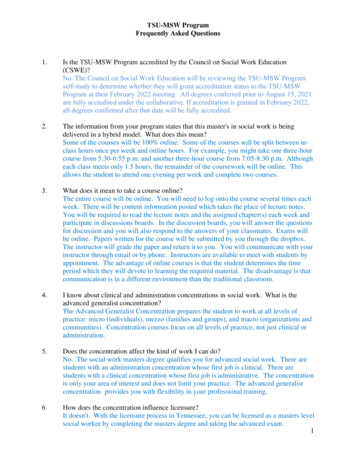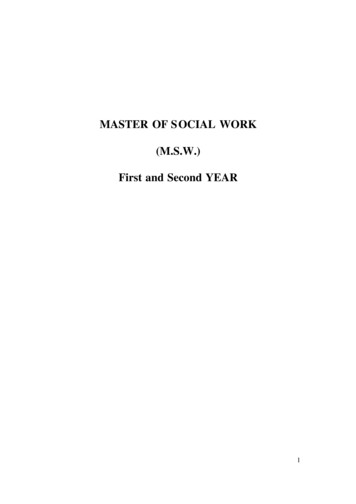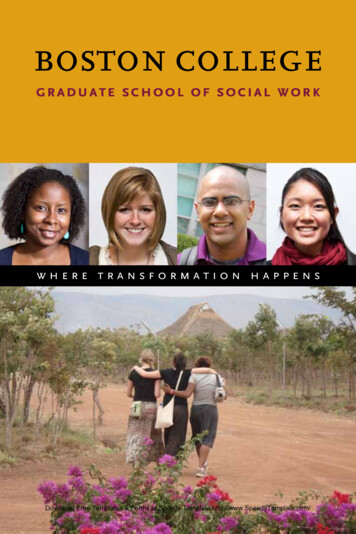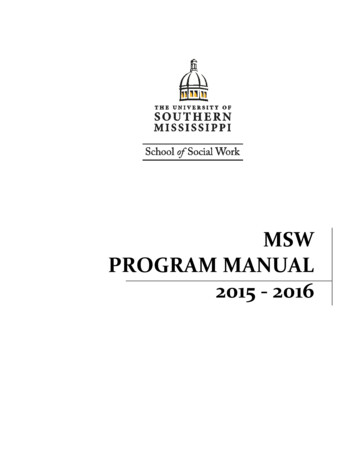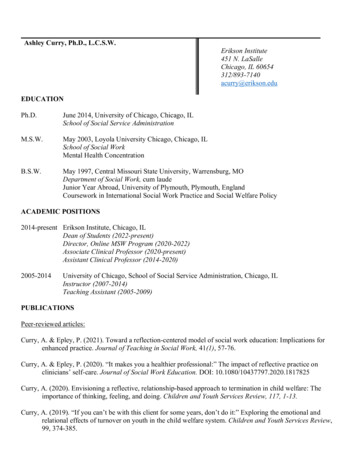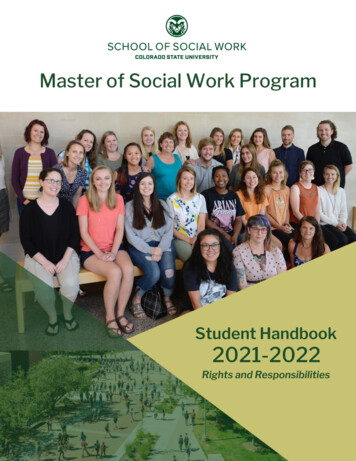
Transcription
This handbook is for MSW students beginning the MSW program in summer or fall 2021.This manual is intended only to provide information for the guidance of the students in the MSWProgram at Colorado State University. The information is subject to change and the School of SocialWork reserves the right to depart without notice from any policy or procedures referred to in thismanual. This manual is not intended to be and should not be regarded as a contract between theColorado State University School of Social Work and any student or other person.School of Social Work Website: https://www.chhs.colostate.edu/sswi
Welcome to the School of Social Work at Colorado StateUniversity!Message from the Director of the School of Social WorkI am thrilled to welcome you to a passionate group of dynamic learners andleaders! By choosing to pursue your graduate education in the School of SocialWork, you join the ranks of influential practitioners, advocates, and thinkerswho gain skills to address individual challenges, promote strengths andresilience, and dismantle structural oppression.The School of Social Work at CSU is noted for its outstanding students and itsexceptional faculty. We emphasize cutting-edge, experiential learningbased upon scientific inquiry and social work ethics, responsive to ever-changing local and globalcontexts. Through its advanced generalist focus, our MSW program prepares graduates to engage inpractice, leadership, critical thinking, and lifelong learning.We are proud that our MSW program is fully accredited by the Council on Social Work Education andhas been in place for over 30 years. Social work is an expanding, in-demand profession with diversecareer possibilities across many sectors of practice.Students at the School of Social Work come to the classroom with work or personal experiences thatenrich class discussions. The faculty are international experts in areas including behavioral health,child welfare, equity and inclusion, social policy, and human-animal interventions. They bringknowledge from their research and practice to support social change and academic excellence.From the bottom of my heart, I welcome you to our learning community. I wish you the very bestnow and throughout your social work career.Charlotte Lyn Bright, PhD, MSWDirector and Professor, School of Social Workii
Message from the Director of the MSW Program and Assistant Director of theSchool of Social WorkWelcome to the profession of Social Work, one of the most challenging andsimultaneously rewarding careers imaginable! According to the U.S. Departmentof Labor Bureau and Statistics, Social Work is one of the fastest growing careersin the United States and the need for trained social workers is strong.Social work differs from other helping professions in several ways. Social work isguided by a code of professional values and ethics, with an emphasis on socialand economic justice, and diversity. A person-in-environment focus and astrengths-based theoretical framework empowers social workers to workcollaboratively with individuals, families, groups, organizations, and communitiesto overcome obstacles and create needed change. The field experience in socialwork provides students with a strong foundation, enabling them to become effective professionals andleaders. For these reasons, the MSW program in the School of Social Work was established as an AdvancedGeneralist Program. A solid graduate education in advanced generalist practice integrates greatertheoretical and methodological knowledge as well as research and evaluation sophistication at all levelsof social work practice.To meet the diverse needs of students, we offer various program options including traditional, face-toface classes at our Fort Collins campus and distance education opportunities in our nationally rankedhybrid program. Lastly, we offer optional curricular areas of emphasis through our graduate certificateprograms, which are administered through our Center for Lifelong Learning and Outreach Education(CLOE).Welcome to the MSW program,Amy MartonisAmy Martonis, MSWAssistant DirectorMSW Program Directoriii
TABLE OF CONTENTSSchool of Social Work History . 1-3The School of Social Work. 4-51. Vision . 42. School Mission . 43. Guiding Principles . 44. Core Values . 4Organizational Chart . 6The MSW Program . 71. Our MSW Mission . 72. MSW Program Goals . 73. Program Evaluation . 74. Leadership Structure. 7The Center for Lifelong Learning and Outreach Education . 7-91. Graduate Certificate Programs . 82. PreK-12 School Social Work Certificate . 83. Conflict Resolution and Mediation .84. Certificate in Advanced Clinical Behavioral Health .85. Certificate in Nonprofit Administration .96. Certificate in Military and Veteran Culture .9Dual Degree Program MSW/MPH . 9MSW Degree Requirements . 101. Program Options . 10Curriculum Description . 11-141. Part Time Options . 122. Part Time Advanced Standing. 123. Elective Options . 13Academic Advising . 14Graduation Requirements. 15-19MSW Field Practicum Requirements . 20-21School of Social Work Academic and Professional Standards. 22-341. Scholastic Performance Standards . 222. Professional Performance . 223. Grievance Procedure for the School of Social Work . 284. MSW Program Attendance Policy . 325. Children on Campus. 346. Dogs on Campus . 347. Student Records. 348. Student Organizations and Committee Participation . 349. Alumni Network . 35Student Support and Wellness Resources . 35-38Appendix . 39-48iv
Contact InformationOffice Phone: 970.491.6612Fax: 970.491.7280School of Social WorkCampus Delivery 1586Fort Collins, CO 80523TitleSchool of SocialWork InterimDirectorNameDr. David uMSW ProgramDirectorAmy Martonis, MSW970.491.0996Amy.Martonis@colostate.eduField EducationDirectorLiz Davis, MSW970.491.3433Liz.Davis@colostate.eduMSW AdvisorMindy Van Kalsbeek,MSWN/AMindy.Van kalsbeek@colostate.eduGraduate ProgramCoordinatorTimothy ce ProgramLiaisonSarah Rudisill, 6321FinancialAid@colostate.eduStudent FinancialAid – On CampusDistance StudentsRegistrar’s OfficevPhoneSpecialprograms@colostate.eduMain Office970.491.4860Registrarsoffice@colostate.edu
The School of Social Work – Our HistoryThroughout its history, the School of Social Work (SOSW) at Colorado State University has made acontinuous effort to develop and maintain a program that is responsive to three distinct, but related,interests: 1) the profession of social work as represented by the Council on Social Work Education’sEducational Policy and Accreditation Standards; 2) the human services agencies and clients in the state,the region, the nation, and the globe; and 3) the land-grant oriented mission and goals of Colorado StateUniversity. The following abbreviated history of social work education at Colorado State demonstrateshow these three interests have merged to create and shape the social work education programs offeredtoday.In the mid-1960s, the U.S. government initiated a program (administered by state social servicesagencies) to increase the supply of social workers by making funds available through Title XX of theSocial Security Act (and predecessor legislation) designed to encourage universities to createbaccalaureate-level social work education programs. Although Colorado State University (CSU) hadpreviously offered a few social work courses in its Department of Sociology, these courses did notconstitute a program that would prepare a graduate for social work practice. In 1968, the ColoradoDepartment of Social Services and CSU entered an agreement to create a full baccalaureate social workmajor that would be housed in the Department of Sociology, delivered by a faculty of professional socialworkers, and funded with Title XX funds supporting 75% of the program costs. The agreementanticipated that the cost of operating the program would gradually shift to the university and by 1977 itwould be fully funded by CSU. A total of 150 students initially declared the social work major, and thefirst graduating class received the BA in social work in 1971.In 1970, the Council on Social Work Education initiated a process of accreditation for baccalaureatesocial work education by granting “approval” status to 151 schools that met the established criteria.CSU was one of the first universities to attain that national recognition. Four years later “approval” wasupgraded to professional “accreditation,” and again, CSU was among the first 135 baccalaureate socialwork education programs to achieve full accreditation – which has been maintained continuously sincethat time. Enrollment surged to a high of 375 majors during the mid-1970s, and it was necessary to capthe major at 325 students because new resident instruction resources were devoted to taking over theagreed-upon increasing percentage of program costs rather than funding new faculty positions to meetthe growing student demand. In the 1980s, the stated goal of the Reagan administration to dismantlepublic human services discouraged students from majoring in social work (both at CSU and throughoutthe United States), and the number of majors at CSU dropped below the cap to as few as 177 in the mid1980s.In 1976 an outreach innovation was introduced aimed primarily at assisting public social servicesworkers to improve their competencies and credentials. Again making use of federal funds availablethrough Title XX, a distance education program was developed, designed to help persons who possessedbaccalaureate degrees in other disciplines obtain a “second bachelor’s degree” in social work. Achievingthis second bachelor’s degree also allowed these students to complete a master’s degree in social work1
in a reduced period of time (i.e., advanced standing) in many MSW programs throughout the UnitedStates.By that time, the new department’s programs were completely funded by the university, and plans wereinitiated to create a master’s level social work education program (MSW). It was determined that thesecond bachelor’s degree would be phased out and its resources devoted to developing the MSW. Atthat time, no MSW programs existed in the states of Idaho, Montana, Wyoming, North Dakota, or SouthDakota and the only other accredited social work education program in Colorado was the MSW programoffered at The University of Denver (DU). The MSW program at DU was primarily oriented to specializedsocial work practice delivered in the Denver metropolitan area, and the tuition at that private universitywas viewed as prohibitive by many potential social work students. Given CSU’s land-grant mission toserve people throughout Colorado, the recognized needs of the neighboring states that did not offer theMSW, and the desire to avoid direct competition with DU, the proposed MSW program was oriented topreparing advanced generalist social workers especially capable of responding to the human servicesneeds of small towns and rural areas or communities that were undergoing rapid transition (e.g., energyboom/bust towns, urban sprawl). That focus was later expanded to include preparation to serveresidents in urban areas, especially along the Front Range.In July 1984 the MSW program was approved by the Colorado Commission on Higher Education and inJune 1985 it was accepted into candidacy for accreditation by the Council on Social Work Education.Eligibility for initial accreditation was achieved in 1986, and fully accredited status was granted in 1992.The first class of 18 master’s level graduates received their degrees in 1986.Another major program innovation was approved by the Colorado Commission on Higher Education in1990 when an alternative MSW program (with the University of Southern Colorado in Pueblo) wasinitiated. The University of Southern Colorado (USC), a sister university in the Colorado State UniversitySystem, had by then achieved accreditation for its baccalaureate social work program and joined CSU inmaking the MSW accessible to students from the southern part of the state. The inclusion of USC in thissocial work education effort also was intended to recruit a more culturally diverse student body than isfound in northern Colorado. Approval of this alternative program was granted by the Council on SocialWork Education in 1992, and the first 23 students graduated in 1994. This effort became the ColoradoState University System’s first cooperative program. In 2003, USC merged with CSU and is now namedColorado State University – Pueblo.CSU School of Social Work further expanded its outreach efforts by admitting a cohort of 27 studentsliving in the Western Slope to the MSW program in 1998. Students took their graduate courses in GrandJunction over a four-year period. The first Western Slope class earned MSW degrees in May 2002. TheSchool of Social Work admitted a second cohort of Western Slope MSW students in fall 2003. Thesestudents graduated in May 2006. The first Colorado Springs Distance MSW cohort of students graduatedin December 2008. The second cohort began in January 2009, and graduated in December of 2011. Athird cohort was admitted in Colorado Springs in January 2012. In January 2010, the first CentralColorado MSW cohort was admitted. The Central MSW program was initiated in response to a growingdemand for our weekend distance MSW from across the state of Colorado and beyond. The Centralcohort held classes in Thornton and graduated in December 2012. In January 2015, distance programswere converted to a hybrid model with much of the class experience offered in an online format while2
two weekends per semester are required for face-to-face classroom experiences. Currently the distanceprogram is offered through three cohorts along the Front Range.In an effort to continue to meet the needs of students and the community, the School of Social Workpiloted an Advanced Standing program for students with BSW degrees from undergraduate social workprograms accredited by the CSWE. Approximately 15-25 students with BSW degrees from accreditedschools are admitted each year since.Consistent with its roots in supporting the human services agencies, the CSU School of Social Work hasdevoted considerable effort to outreach activities. Substantial collaborations have been in the areas ofresearch, curriculum development for and provision of statewide training to county child welfare andchild protection workers. In 2002, the name of the Department of Social Work was officially changed tothe School of Social Work to more accurately reflect the increased breadth of activities across nationaland in international arenas.The Social Work Research Center (SWRC) was approved in 2004 representing collaboration betweenColorado State University (School of Social Work) and community partners. Examples of communitypartners include County Departments of Human Services in Colorado (i.e., Larimer, Boulder, Adams, ElPaso, Arapahoe, Broomfield, Pueblo, Weld, Broomfield, and Jefferson Counties), The American Humane,and Larimer County Mental Health. The purpose of these collaborations is to create formal linksbetween human services agencies and higher education by researching and evaluating innovative andstandard programs and research affirmed practices to advance social work practice and theory, promotesocial welfare and social justice, and enhance learning and practice in such areas of child welfare andjuvenile delinquency. The mission of the Center is to serve the people of the State of Colorado, as well asat national and international levels, in the area of social work. The Center provides support to faculty,students, and community partners. It also facilitates training, mentoring and program developmentservices to social welfare agencies, governmental departments, community groups, students, andfaculty.In 2006, the Social Work Center for Lifelong Learning and Outreach Education (CLOE) was established.The Center for Life Long Learning and Outreach Education develops, administers, and integrates degreeand non-degree educational programs that extend outside the on-campus degree programs of theSchool of Social Work. The Center provides oversight to maintain high quality programs that areconsistent with the mission and goals of the School of Social Work, the College of Health and HumanSciences, and Colorado State University. CLOE fosters increased faculty and student involvement incommunity improvement as resources for social workers and human service personnel, providinglifelong learning opportunities, and engaging alumni in both providing and participating in theeducational opportunities offered by the Center.In 2011, the CSU Board of Governors approved a PhD Program in Social Work replacing our successfulinterdisciplinary PhD collaboration with the School of Education.The programs of the Colorado State University School of Social Work have reflected continuingresponsiveness to the needs and interests of the region, the profession of social work, and theUniversity. The School of Social Work is currently one of nine academic units in the College of Health andHuman Sciences that make practical application of knowledge and skills to address the needs of people.3
The School of Social WorkVisionThe School of Social Work will advance social, environmental, and economic justice, promote equity andequality, alleviate oppression, and enhance human health and well-being across local and globalcommunity systems.MissionThe School of Social Work provides exemplary education, applied research, and transformative outreachtoward the accomplishment of our Vision.Guiding Principles1. The School stands for courageous and resolute adherence to professional ethics and values byhonoring commitments and upholding the highest standards of academic and scientific integrity.2. The School is committed to academic rigor, seeking to define and address emerging socialchallenges thru interdisciplinary collaboration and critical inquiry that inspires innovation.3. The School respects, honors, and values individual differences and diverse ideas. Using a lens ofintersectionality, each person is treated with dignity, care, and respect.4. The School cultivates a trusting and transparent environment through inclusive planning anddecision-making with full, accurate, and timely communication of information.5. The School proactively responds to emerging trends and issues through social engagement andexperiential learning, which are integrated in all aspects of our teaching, research, and service.Core Values1.Integritya. Uncompromising adherence to professional ethics and principlesb. Cultivating or demonstrating trust and honesty in how we relate to each other / in allencounters and situationsc. Awareness of how we interact with one another as human beings – this means, to be honest,trust the good intentions of our colleagues, show up authenticallyd. The courage to stand where you’re standing and the tenacity to hold what you believee. Professional and personal2.Transparency --- alternatively, Open and Inclusivea. Clear, open, honest communicationb. Inclusion in decision-makingc. Full, accurate, timely disclosure of informationd. Group power and group decision-making, in terms of how we operate as a group and how weteach empowermente. Courage3.Respecta. Dignity, worthb. Unconditional positive regard4
4.Empathya. Compassion5.Innovative Excellencea. Moving forward with a spirit of scientific inquiry, teaching innovation, and a broader view of“what belongs” to Social Workb. Passionate, systematic curiosity and inquiryc. Inspiring innovation in our studentsd. Academic excellence; thinking differently about problems and solutionse. Recognizing how we act within larger systems and seeking interdisciplinary collaborations –Integrated thinking, ecosystems perspectivef. Being relevant, timely, and responsiveg. Integrated knowledgeh. Community of knowledge seekersi. Passionate curiosity6.Social Action / Service / Active Engagement (or Framework or Lens)a. Unwavering commitment to creating changeb. ACTING towards or in the spirit of social justicec. Commitment to action, to improvement, to changed. Bring change agentse. Being responsive to changing landscapes; being aware of constantly changingcontexts/variables and fluid in our responses5
Organizational ChartPlease note: The organizational chart is updated annually in August. To request or review a current organizational chart, please contact themain office or Morgan.Drake@colostate.edu. 6School of Social Work Interim Director (Dr. Charlotte Bright) MSW Program Director & School of Social Work Assistant Director (Amy Martonis) MSW Advisor BSW Program Director (Brenda Miles) BSW Advisor BSW Academic Support Coordinator PhD Program Director (Anne Williford) Graduate Programs Coordinator Administrative Assistant III** Field Education Director (Liz Davis) BSW Field Coordinator MSW Field Coordinator Distance MSW Field Coordinator Field Program Support Program Assistant II** Outcomes Coordinator Centers SWRC Director Senior Research Scientist RA I RA III RA III RA IV HABIC Director Office Coordinator Program Coordinator CLOE Distance Liaison Post Docs Faculty With PhD Professors (TT or NTT Clinical / Research) Associate Professors (TT or NTT Clinical / Research) Assistant Professors (TT or NTT Clinical / Research) With MSW as Terminal Degree Master Instructor Senior Instructor Instructors Business Officer** Office Coordinator & BSW Support Admin Assistant II** Accounting Tech II Communications Coordinator**
MSW ProgramMSW Program MissionThe mission for the MSW program at CSU is to prepare versatile leaders for professional,ethical Advanced Generalist practice in complex, diverse, and dynamic contexts. The School will providecutting-edge, experiential education, based upon scientific inquiry, that is responsive to evolving needsof local and global communities.MSW Program GoalsThrough experiential learning, in the pursuit of social, economic, and environmental justice, the goals ofthe Advanced Generalist MSW program are to prepare graduates who:1. Serve as skilled practitioners who engage in ethical, autonomous, and multi-disciplinary practiceacross system levels utilizing a Person-in-Environment perspective.2. Serve as leaders who advance social, economic, and environmental justice, promote humanrights, and engage in social action to eliminate oppressive conditions for all people.3. Serve as leaders that value and appreciate human relationships and diversity in its multipleforms and who model and advocate for inclusive practices and cultural humility.4. Practice life-long learning, engage in scientific inquiry, and utilize critical thinking to informpractice at all system levels.5. Critically apply relevant theories and social work values to engage, assess, intervene andevaluate practice within changing contexts at all systems levels.Program EvaluationThe MSW Program routinely collects and evaluates data to monitor progress and achievement ofprogram goals. Students are included in this process through their involvement in course evaluations,evaluations of field organizations, field instructors, and other means. Students are invited to provideadditional feedback through Roundtable meetings held at least once per year, through participation in thestudent association, and representation on Faculty Council. Program evaluation reports are updatedannually on the School’s website.Student performance data is collected through embedded measures within course assignments and ismanaged by the Outcomes Committee. If you would like further information about this data collectionand assessment process, please contact your program director or the Outcomes Committee.The Center for Lifelong Learning and Outreach EducationThe School of Social Work is actively and creatively involved in continuing education and outreachthrough the Center for Lifelong Learning and Outreach Education (CLOE).The Center for Lifelong Learning and Outreach Education develops, administers, and integrates degreeand non-degree educational programs that extend outside the on-campus degree programs of the Schoolof Social Work. These programs include Hybrid MSW offerings and Graduate Certificate Programs thatallow students to create curricular emphasis within specific fields of practice. The Center exercisesoversight to maintain high quality programs that are consistent with the mission and goals of the School ofSocial Work, the College of Health and Human Sciences, and Colorado State University.7
Admissions Policies and ProceduresThe Graduate School and MSW program application process is combined, and is entirely online. Access isavailable during each cohort’s application window.Criteria for admission:Within the framework of the policies established by the university and the Graduate School, the School of SocialWork will have the responsibility and authority for the recruitment, screening, selection, and admission of itsstudents.The School will admit those applicants with the greatest potential for completing the master’s level course ofstudy and becoming effective social work practitioners. In its review of applications, the School seeks evidence ofan applicant’s capacity to think critically, do graduate-level work, reason logically, and think creatively. Asuccessful applicant is expected to reflect attitudes that are congruent with basic social work values, that arerespectful of the dignity of all human beings, and that indicate a sense of social responsibility. Applicants must beable to meet the emotional requirements of the program and possess a capacity to develop positive interpersonalrelationships.The School is committed to drawing the student body from applicants with a demonstrated concern for socialissues and the desire to work for the enhancement of life for all people, especially those groups devalued bysociety. A successful applicant must evidence a strong determination to acquire the competencies needed foreffective advanced generalist practice within the context of community and possess a willingness to develop theabilities needed for contributing to practice and policy development and the knowledge base of the profession.Criter
second bachelor's degree would be phased out and its resources devoted to developing the MSW. At that time, no MSW programs existed in the states of Idaho, Montana, Wyoming, North Dakota, or South Dakota and the only other accredited social work education program in Colorado was the MSW program offered at The University of Denver (DU).
